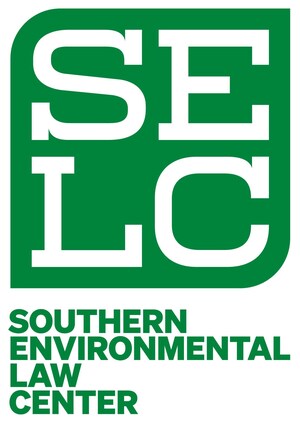CHARLOTTESVILLE, Va., Feb. 24, 2022 /PRNewswire/ -- The Southern Environmental Law Center (SELC) announced the winners of its 2022 Phillip D. Reed Environmental Writing Award today. The work of this year's winners brings to light the healthcare calamity unfolding in rural Alabama due to neglected sewage infrastructure.
In the book category, Catherine Coleman Flowers received the Reed Award for Waste: One Woman's Fight Against America's Dirty Secret. Alexis Okeowo received the Reed Award in the journalism category for "The Heavy Toll of the Black Belt's Wastewater Crisis," published by The New Yorker.
The Reed Award celebrates writers who achieve both literary excellence and offer extraordinary insight into the South's natural treasures and environmental challenges. Presented each year, the Reed Award recognize outstanding writing on the Southern environment in two categories: the Book Category for works of nonfiction (not self-published) and the Journalism Category for newspaper, magazine, and online writing published by a recognized institution such as a news organization, university, or nonprofit group.
An award ceremony will be held in honor of the winners during the Virginia's Festival of the Book at 4 p.m. on March 18, 2022. Michael Mann, an American climatologist and geophysicist, and director of the Earth System Science Center at Pennsylvania State University, will be this year's featured speaker. His most recent book, The New Climate War, discusses how fossil fuel companies have waged a 30-year campaign to deflect blame, responsibility and delay action on climate change, and offers a battle plan for how we save the planet.
This event is free and open to the public. It will be held at the CODE Building, located at 225 West Water Street on the downtown mall in Charlottesville. Those unable to attend in person can broadcast the Reed Award presentation online. Everyone can register for both the digital and in-person event at the following link:
https://www.southernenvironment.org/reed-award-registration/
This Year's Book Award Winner: Catherine Coleman Flowers
Flowers grew up in Lowndes County, Alabama, a place that's been called "Bloody Lowndes" because of its violent, racist history. Once the epicenter of the voting rights struggle, today it's Ground Zero for a new movement that is Flowers's life's work. It's a fight to ensure human dignity through a right most Americans take for granted: basic sanitation. Too many people, especially the rural poor, lack an affordable means of disposing cleanly of the waste from their toilets, and, as a consequence, live amid sewage.
Flowers calls this America's dirty secret. In Waste she shares the inspiring story of her evolution as an activist, from country girl to student civil rights organizer to environmental justice champion and MacArthur Fellow. It shows how sanitation is becoming too big a problem to ignore as climate change brings sewage to more backyards, and not only those of poor minorities.
This Year's Journalism Award Winner: Alexis Okeowo
Okeowo is a staff writer at The New Yorker who has reported on conflict, human rights, and culture across Africa, as well as from Mexico and the American South. In "The Heavy Toll of the Black Belt's Wastewater Crisis" for the New Yorker, Okeowo explores the fact that many rural households in America don't have access to safe sewage systems. Their piece focuses on Alabama communities entrenched in poverty and located in an area with unusual geology which has created a public health disaster.
About the Reed Award
SELC created the Reed Environmental Writing Award in 1994 to enhance public awareness of the value and vulnerability of the South's natural treasures and to recognize and encourage the writers who most effectively tell the stories about the region's environment. The award is named for SELC founding trustee Phil Reed, a talented attorney and committed environmental leader who believed deeply in the power of writing to change hearts and minds.
Selected by a distinguished panel of judges, Reed Award winners have recently included Paul Bolster author of Saving the Georgia Coast: A Political History of the Coastal Marshlands Protection Act, Tony Bartelme of The Post and Courier in Charleston, for his in-depth reporting on South Carolina's coastal environment; Margaret Renkl, author of Late Migrations: A Natural History of Love and Loss; Megan Mayhew Bergman, who received the award in the journalism category for "Climate Changed," a series on southern attitudes toward climate change published by The Guardian; Earl Swift, author of Chesapeake Requiem: A Year with the Watermen of Vanishing Tangier Island; Edward O. Wilson, the "father of biodiversity"; Janisse Ray, a writer, naturalist and activist who has been inducted into the Georgia Writers Hall of Fame; science writer Deborah Cramer, whose work has won honors from the Society of Environmental Journalists and the National Academy of Sciences; and J. Drew Lanham, author of The Home Place: Memoirs of a Colored Man's Love Affair with Nature.
Southern Environmental Law Center
The Southern Environmental Law Center is one of the nation's most powerful defenders of the environment, rooted in the South. With a long track record, SELC takes on the toughest environmental challenges in court, in government, and in our communities to protect our region's air, water, climate, wildlife, lands, and people. Nonprofit and nonpartisan, the organization has a staff of 170, including 90 attorneys, and is headquartered in Charlottesville, Va., with offices in Asheville, Atlanta, Birmingham, Chapel Hill, Charleston, Nashville, Richmond, and Washington, D.C. southernenvironment.org
SOURCE Southern Environmental Law Center

WANT YOUR COMPANY'S NEWS FEATURED ON PRNEWSWIRE.COM?
Newsrooms &
Influencers
Digital Media
Outlets
Journalists
Opted In






Share this article